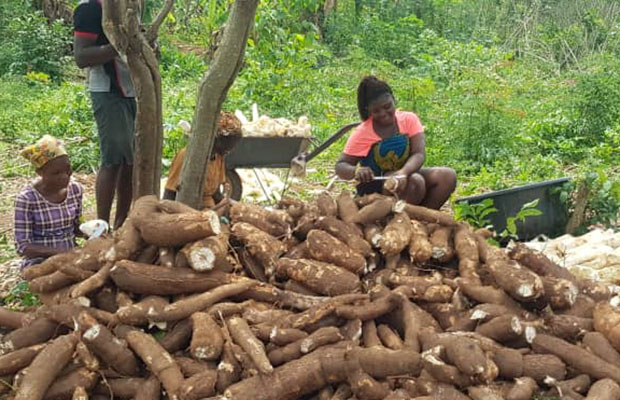
Growing Sustainable Futures from the Ground Up
Agriculture is the economic mainstay of Sagamu, Nigeria—yet many of the region’s disadvantaged residents are excluded from the opportunities it provides. A new Salesian-run training program at St. Joseph’s Farm aims to change that, one student at a time.
Salesian missionaries established St. Joseph’s Farm in 2014, when they first arrived in Sagamu and noticed a disconnect between the availability of desirable land and the lack of local knowledge to cultivate it.
“Sagamu’s rich vegetation and vast acreage of undeveloped land have always attracted interest in its agricultural potential,” says Father Gus Baek, director of Salesian Missions. “And those same characteristics explain why the region is known for its production of cocoa and kola nuts, among other crops. At the same time, there traditionally hadn’t been any relevant educational initiatives to help aspiring farmers within the community gain the advanced knowledge and skills they needed—not only to enter the industry, but also to stake their claim as entrepreneurs and visionaries.”
Situated on nearly 62 acres of land, St. Joseph’s Farm has become a center of excellence for crop production, raising livestock, research and other relative training. Here, disadvantaged youth without a formal education can learn planting, cultivation and harvesting practices that enable them to earn a stable income while boosting their food security. Existing small-scale farmers can also learn improved agricultural techniques which help them increase their productivity and revenue while growing a more sustainable sector—and their own futures—from the ground up.
Now, a new program funded in part by compassionate donors of Salesian Missions will expand such training opportunities to a greater segment of vulnerable residents.
Already, 40 participants—many of whom are widows or young women living in poverty—received practical, hands-on education in contemporary farming techniques. The program also continues to assist existing small farmers develop new skills to manage their land in order to establish long-term sustainability.
Ultimately, our missionaries intend to enroll 100 students per session in this new program, which they hope will indirectly benefit as many as 5,000 people. In the next few years, St. Joseph’s Farm will also concentrate on expanding its on-site production to include essential crops according to season and demand.
“At St. Joseph’s Farm, trainees are able to fine-tune their techniques,” says Father Gus. “The better employment opportunities that result will also help to curb migration and provide stable support for vulnerable people in the community now, and long into the future.”
We are grateful to our many Salesian Missions donors, whose generosity help make programs like these possible.
Our mission improves the lives of vulnerable populations around the world. What’s your mission?
Learn more about our work in Nigeria.

